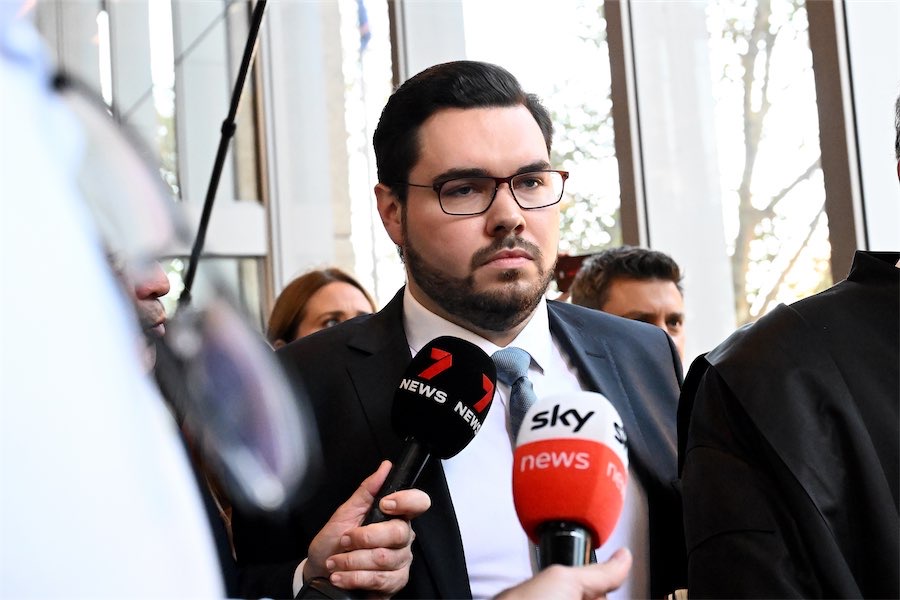Letter writer IAN HUBBARD worries that the planning minister is not getting the right community feedback.
WHILE it appears that the Minister for Planning, Mick Gentleman, doesn’t listen to the numerous submissions from community groups and homeowners raising concerns regarding the deregulation of controls and “up-zoning” with permission for greater density proposed in the new planning framework, he has received feedback from the community.

While providing special rules for the hundreds of Mr Fluffy blocks by allowing separate-titled, dual occupancies on the many blocks in established areas that were over 700sqm.
This was to give developers a bit of a leg up and a higher land price for the government. The resulting builds weren’t cheap, but this provides an indication of what was going to be allowed in established areas as part of the new zoning changes.
He was reported in the media to have commented: “We had feedback then from the community who live in these areas saying: ‘Why can’t I do that now?’.”
Mr Gentleman went on to say: “The conversation actually came from older people saying: ‘I still want to live in the area that I have, but I might want to build something else on my block, maybe my kids might move in and I’ll stay in my house’.”
This was a heart-rending story. Fair enough, the minister has only had the planning gig for 10 years so he probably didn’t know to inform these oldies that they are currently allowed to build a dual occupancy on their RZ1 block (800sqm +). They just can’t separately title the blocks and flog one off.
Minister, we know you’re using advanced research and consultation processes to gauge what the community really wants in the proposed planning framework, but I hope your consultation is not the same 5 per cent of the community that proposed apartments and townhouses are built with no car parks.
Ian Hubbard, via email
Graffiti blight makes me angry and sad
HAS anyone else noticed the explosion of unsightly graffiti vandalism in Canberra?
I think the southside must take the cake, but I would be interested to hear from the northsiders.
I think that the ACT government has just given up. Every utility box, underpass, overpass and many fences are covered with this unsightly mess.
I am a proud Canberran, born and bred, but this graffiti blight makes me angry and sad to see what has happened to our once proud bush capital.
R Nano, via email
No way Canberrans can be heard
THERE have been numerous letters of despair about the planning situation in Canberra.
No longer will we be the bush capital but a poorly planned city with no regard for the changing climate and the environmental situation.
Paul Costigan’s article this week not only sums up the dire situation with our planning authorities and ACT politicians but puts forward a possible solution.
It beggars belief that there is no way Canberrans can be heard and their suggestions taken on board. Just like the West Basin debacle, we were told well before the general public knew that the lake would be filled in and apartments plonked there.
We were told some things are non-negotiable. This non- negotiable attitude has now reached new heights. No wonder we have given up responding to endless badly written planning documents.
Penny Moyes, Hughes
Time the MLAs came out of hiding
AS many pick themselves up after trying to respond to the final tranche of “outcomes” planning reform documentation and their likely consequences at suburb and street level (“Why the planning chief has failed Canberra”, CN March 15), they may wish to reflect on the chief planner’s online homily to the broader community on August 9, 2019:
“My key focus as ACT chief planner has always been ‘the people’ and the vital contribution they can and do make to planning this great city… Your feedback plays a key role through your unique ability to communicate useful observations into issues that may affect your neighbourhood… The community has the collective power to achieve positive outcomes on development projects. As active community members we can all play a role in planning our city.”
This short-lived series of insights and means of engagement recently disappeared from public sight when, like the current planning system’s processes, the planning directorate’s website was also “refreshed” and pared down.
It is time for all ACT MLAs to come out of hiding on planning matters and start some serious and ongoing engagement with their local constituents, especially those who expressed considered views and concerns in the 400 or so submissions received recently by the planning directorate (“Territory plans will provoke community anger”, CN March 15).
Sue Dyer, Downer
RBA has got it wrong nine times
IGNORING the fact that the majority of Australia’s inflation is imported, the RBA has slapped a tenth rate rise on the Australian community.
This means it regards the previous nine rises as having been ineffectual. In other words, the RBA has misconstrued the inflation issue, and already got the solution wrong no less than nine times.
A failure rate of that magnitude would send any normal business to the wall. Why do we tolerate it at a national level, whereby this strategy is sending countless numbers of homeowners to the wall?
The government’s review of the RBA, now completed, is expected to report this month. Let’s hope that it places inflation within a wider context of national economic and personal well being, differentiates between home grown and imported inflation, and identifies the real bases of Australia’s economic strength as areas to foster.
Noting that the terms of three members of the RBA board expire this year, I suggest that the government has an opportunity to break with the past and appoint new members with proven expertise at the macro-economic level.
Paul Varsanyi, Kambah
Max is obviously not a scientist
MAX Flint (Letters, CN March 9) is obviously not a scientist. He claims that if Australia miraculously ceased to exist, it would “not make one iota of difference to global warming let alone climate change.
He seems not to understand that there can’t be one without the other.
He then concedes “given that slow warming is occurring, whatever the drivers may be, Australia’s priority is to protect its citizens from the possible consequences, not to pursue needless emissions-reduction policies that risk destroying our economy for absolutely zero effect”.
The CSIRO has shown that Australia has warmed by 1.47 degrees C since records began in 1910. That is certainly not “slow” warming: the Intergovernmental Panel on Climate Change, in its Paris Agreement set a medium-term target of 1.50 degrees above pre-industrial levels and carbon neutrality by 2050. Australia has, for all intents and purposes, already broken through the first barrier.
Mr Flint concludes that we must “look to nuclear energy … before the unsustainable renewables policy sends us broke while disfiguring the countryside.”
Energy experts and scientists are virtually unanimous in concluding that “renewables” with the latest battery technology are by far the least expensive, and now most reliable, form of energy production.
Solar farms cover relatively small areas and leave ample green (or grazing) space between panels; and wind turbines are so widely spaced that there is almost no loss of productivity from the land upon which they are built.
Finally, standard nuclear power stations cost about $10-12 billion and take about 10-12 years to build. Thanks to almost a decade of government inaction, we cannot afford to wait that long.
Dr Douglas Mackenzie, Deakin
Enough detail to satisfy the doubters
OBJECTING to the Voice is one thing, but Vi Evans (Letters, CN March 8) is surely aware that it falls within the rules of the constitution (which I presume she supports). The constitution doesn’t set out “details”. It articulates the principle (exampled in Sec 51), which the proposed amendment follows, leaving public and parliamentary debate to occur prior to legislation of its processes.
Nor can government “just do as it likes” unless it has a clear majority in both houses; a very rare event which, if misused, can still carry heavy political consequences.
As a legal affairs commentator, Hugh Selby (CN March 9), should certainly know better. He makes several flawed observations (such as, “we don’t tolerate discrimination” and cites ACT legislation when the Voice legalities are national).
With due respect, Hugh’s constitutional expertise presumably sits somewhere below that of former chief justice of the High Court, Robert French, who recently addressed a high-level legal symposium with a comprehensive justification for the Voice on legal, historical and moral grounds.
Vi and Hugh, and anyone else harbouring doubts, might acquaint themselves with it (“The Voice: a step forward for Australian nationhood”). Furthermore, French’s assessment confirms another former chief justice’s writings; Murray Gleeson’s 2019 “Recognition…a worthwhile project”, in which he explains that “…it is [also] one that is consistent with the nature of the constitution and the values that underpin it”.
Surely enough “detail” there to satisfy the staunchest doubter.
Eric Hunter, Cook
‘Refreshing’ letters to the editor
SO refreshing to read in “Letters”, CN March 9 by Vi Evans re: the Voice and Max Flint re: climate change, their common sense logic.
We need more of this, there is so little of it these days. Keep up the good work, Vi and Max.
Carol Dunnet, Wanniassa
Zeynep is no more weird than Robert
A QUOTE from Robert Macklin’s “Gadfly” column on March 9: “But that was before I read a devastating column in the “New York Times” by one Zeynep Tufekci (Americans do have the weirdest names)”.
How rude.
There are probably as many women called Zeynep as there are men called Robert.
Tufekci is a straight up and down the wicket Turkish surname, just as Macklin is a straight up and down the wicket Scottish name.
Therefore, the name Zeynep Tufekci is no more weird than the name Robert Macklin.
Michael Stark, via email
Who can be trusted?
In a world of spin and confusion, there’s never been a more important time to support independent journalism in Canberra.
If you trust our work online and want to enforce the power of independent voices, I invite you to make a small contribution.
Every dollar of support is invested back into our journalism to help keep citynews.com.au strong and free.
Thank you,
Ian Meikle, editor





Leave a Reply